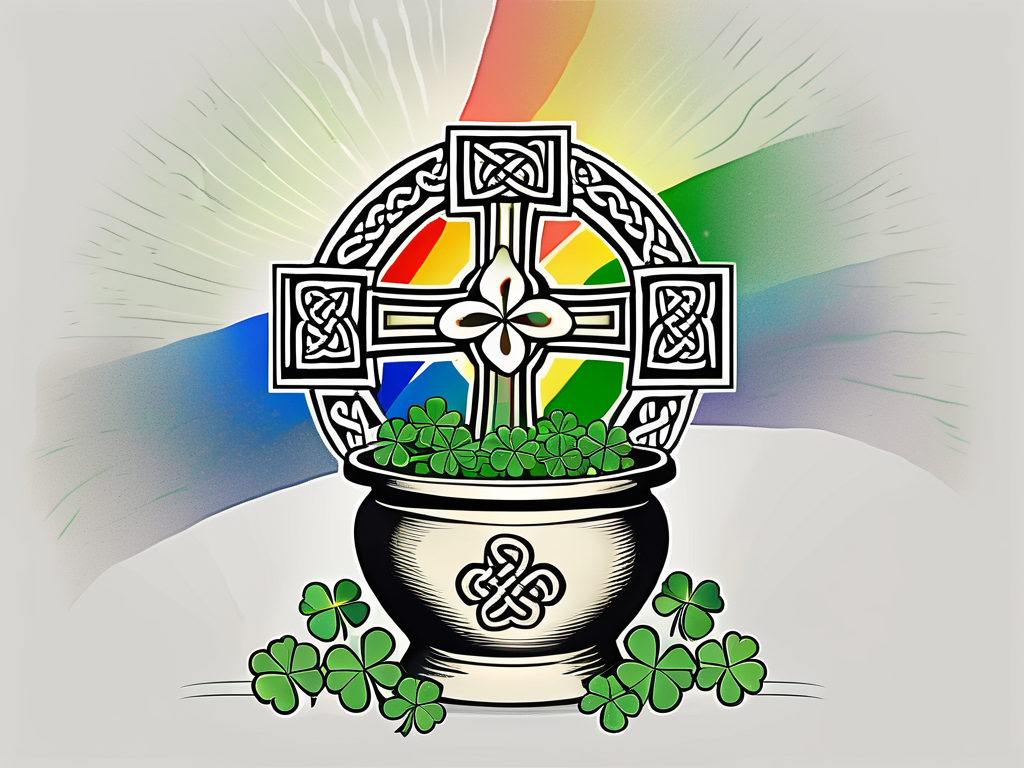Born in the sixth century, Saint David of Wales holds a special place in Welsh history and culture. As the patron saint of Wales, he is celebrated every year on March 1st, a national holiday known as Saint David’s Day. Let’s take a closer look at the life, teachings, and lasting legacy of this beloved figure.
The Early Life of Saint David
Birth and Parentage
Saint David, also known as Dewi Sant in Welsh, was born in the kingdom of Ceredigion. According to legend, his mother, Saint Non, gave birth to him on the cliffs of Pembrokeshire during a fierce storm. This momentous event took place near a small chapel dedicated to Non, which later became known as Saint Non’s Chapel.
The birth of Saint David was seen as a miraculous event, as the storm that raged outside seemed to reflect the power and significance of his future role as a spiritual leader. The cliffs of Pembrokeshire, where he was born, became a place of pilgrimage for many believers who sought to connect with the divine presence that surrounded his birth.
Saint Non, his mother, was known for her unwavering faith and devotion. It is said that she had a vision before David’s birth, in which an angel appeared to her and foretold the greatness of her son. This divine intervention further solidified the belief that David was destined for a life of holiness.
Education and Early Influences
As a young boy, David received a religious education and was deeply influenced by the teachings of his uncle, Saint Illtud. Under his uncle’s guidance, David learned about the principles of Christianity and the importance of leading a virtuous life.
David’s thirst for knowledge and spiritual understanding led him to pursue further education at the renowned monastic school of Henllan. Here, he studied alongside other young scholars, immersing himself in the rich teachings of the Church and expanding his understanding of theology and philosophy.
During his time at Henllan, David’s reputation as a dedicated and disciplined student grew. He was known for his unwavering commitment to his studies and his ability to engage in deep theological discussions. His peers and teachers recognized his potential as a future leader in the Church.
David’s devotion to his faith only grew stronger as he embarked on a pilgrimage to Jerusalem. The experiences he encountered during his travels helped shape his future path as a revered figure in Welsh Christianity. The holy sites he visited and the encounters he had with fellow pilgrims deepened his spiritual connection and broadened his understanding of the global Christian community.
Throughout his journey, David witnessed the power of faith in transforming lives and communities. He saw firsthand the struggles and triumphs of believers from different cultures and backgrounds, reinforcing his belief in the universal message of love and compassion that Christianity espoused.
Upon his return from Jerusalem, David’s experiences and newfound wisdom inspired him to spread the teachings of Christianity throughout Wales. He became a beacon of hope and a symbol of spiritual guidance for the Welsh people, leading them towards a deeper understanding of their faith and a more profound connection with God.
Saint David’s Journey to Sainthood
Saint David, also known as Dewi Sant, was a remarkable figure whose journey to sainthood is filled with awe-inspiring miracles and compassionate deeds. His reputation as a holy man was solidified through the numerous miracles he performed, which left people in awe of his divine power.
His Miracles and Deeds
Stories of Saint David’s extraordinary abilities spread far and wide, captivating the hearts and minds of people from all walks of life. It is said that he had the power to heal the sick with a mere touch of his hand. People would travel from far and wide, seeking his miraculous intervention to cure their ailments and find solace in his presence.
One of the most remarkable miracles attributed to Saint David was his ability to restore sight to the blind. It is said that he would lay his hands on their eyes, and they would suddenly regain their vision, filled with gratitude and wonder.
But perhaps the most astounding miracle associated with Saint David was his ability to bring a dead boy back to life. The story goes that a grieving mother brought her lifeless child to Saint David, pleading for his intervention. With unwavering faith and a heartfelt prayer, Saint David breathed life back into the boy’s body, bringing joy and hope to all who witnessed this divine act.
However, it wasn’t just his miraculous acts that garnered attention. Saint David was also known for his compassionate deeds and acts of kindness towards others. He taught his followers the importance of helping those in need and living a life guided by love and humility.
He would often be found feeding the hungry, providing shelter to the homeless, and offering solace to the downtrodden. His selfless acts of kindness touched the lives of many, inspiring them to follow in his footsteps and embrace the virtues of compassion and generosity.
The Process of Canonization
Following his death, the efforts to canonize Saint David began. His profound influence on Welsh Christianity and the indelible impact he had on the lives of countless individuals made him an obvious candidate for sainthood.
A thorough investigation into his life and deeds was conducted, with testimonies from those who had witnessed his miracles and experienced his compassionate nature. The overwhelming evidence of his sanctity and the countless lives he had touched led to his official canonization by Pope Callixtus II in the twelfth century.
This declaration elevated Saint David’s status to that of a revered figure, not only in Wales but also within the wider Christian world. His legacy continues to inspire people to this day, reminding us of the power of faith, compassion, and the potential for miracles in our own lives.
The Teachings and Philosophy of Saint David
Saint David, also known as Dewi Sant, was a revered figure in the history of Christianity. Born in the 6th century, he dedicated his life to spreading the message of love, compassion, and faith. His teachings and philosophy have left an indelible mark on the world, inspiring countless individuals to seek a deeper connection with the divine.
His Sermons and Messages
Saint David was renowned for his ability to deliver powerful sermons and convey profound spiritual truths. His words resonated with people of all backgrounds, offering guidance on how to live virtuously and find inner peace. His sermons were not mere lectures but transformative experiences that touched the hearts and minds of his listeners.
Through his teachings, he emphasized the importance of simplicity, humility, and service to others. He believed that every individual had the potential to embody goodness and make a positive impact on society, regardless of their social status. Saint David’s sermons were filled with anecdotes, parables, and practical advice that encouraged his followers to lead a life of righteousness and compassion.
One of his most well-known sermons focused on the concept of forgiveness. Saint David stressed the importance of letting go of grudges and embracing forgiveness as a means of healing and personal growth. He spoke of the transformative power of forgiveness, both for the individual and for society as a whole. His message resonated deeply with his listeners, inspiring them to let go of past grievances and embrace a path of reconciliation and peace.
Another central theme in Saint David’s sermons was the pursuit of spiritual enlightenment. He encouraged his followers to seek a deeper understanding of themselves and the world around them. He taught that true wisdom comes not from external knowledge but from inner reflection and connection with the divine. Saint David’s teachings on spirituality and self-discovery continue to inspire seekers of truth to this day.
Impact on Welsh Christianity
Saint David’s influence on Welsh Christianity cannot be overstated. His teachings helped shape the religious identity of Wales, fostering a deep sense of spirituality and devotion among its people. His sermons were not limited to the confines of the church; he often traveled throughout Wales, delivering his messages to large crowds in open fields and public gatherings.
His impact on Welsh Christianity was not limited to his lifetime. Even after his passing, his legacy continued to inspire generations of Welsh Christians. His teachings became the foundation of the Welsh Christian tradition, influencing the practices, rituals, and beliefs of the people. The spirit of Saint David’s teachings can still be felt in the churches, chapels, and religious communities across Wales.
One of the most enduring aspects of Saint David’s legacy is his emphasis on community and fellowship. He believed that true spirituality could only be realized in the context of a supportive and loving community. He encouraged his followers to come together, to support one another, and to work towards the common good. This sense of community and shared purpose became a defining characteristic of Welsh Christianity.
Saint David’s teachings also had a profound impact on the cultural and social fabric of Wales. His emphasis on simplicity and humility resonated with the Welsh people, who have a long-standing tradition of valuing these virtues. His teachings helped foster a sense of national identity rooted in faith, compassion, and service to others.
In conclusion, Saint David’s teachings and philosophy continue to inspire and guide individuals on their spiritual journey. His sermons and messages, filled with wisdom and compassion, have left an indelible mark on the world. His impact on Welsh Christianity and the cultural identity of Wales is a testament to the enduring power of his teachings. As we reflect on his life and legacy, we are reminded of the timeless truths he shared and the transformative potential of a life lived in service to others.
Saint David’s Day: A National Celebration
Traditions and Customs
Saint David’s Day is a day of celebration across Wales. People come together to honor Saint David’s memory and embrace their Welsh heritage. Traditional customs include wearing daffodils or leeks, the national emblems of Wales, as well as participating in eisteddfods, which are cultural festivals showcasing music, poetry, and other artistic expressions.
The Significance in Welsh Culture
Saint David’s Day holds great significance in Welsh culture, serving as an opportunity to express national pride and celebrate all things Welsh. The holiday not only highlights Saint David’s contributions to the spiritual life of the country but also reinforces the importance of Welsh language, literature, and traditions.
The Legacy of Saint David in Modern Wales
Influence on Welsh Identity
Saint David’s impact on Welsh identity extends far beyond his religious significance. He represents the values that Wales holds dear: compassion, community, and a deep connection to the land. His legacy reminds the Welsh people of their rich cultural heritage, urging them to embrace their roots and preserve their unique traditions.
Saint David in Art and Literature
Throughout the centuries, artists and writers have been inspired by Saint David’s story and have commemorated his life in various forms of artistic expression. Paintings, sculptures, and literary works pay tribute to his spiritual journey and the profound impact he had on Welsh society.
His story continues to captivate the imaginations of individuals worldwide, serving as a testament to the enduring power of faith and the profound influence one person can have on the world.
Wrapping Up
As we reflect on the life of Saint David of Wales, it becomes clear why he is held in such high regard. From his humble beginnings to his eventual canonization, his journey exemplifies the triumph of compassion, humility, and a steadfast commitment to faith. His teachings and legacy continue to shape Welsh spirituality and cultural identity, making him a revered figure in Welsh history.
So, on Saint David’s Day, let us remember and celebrate the life and contributions of this extraordinary man who forever holds a special place in the hearts of the Welsh people.












